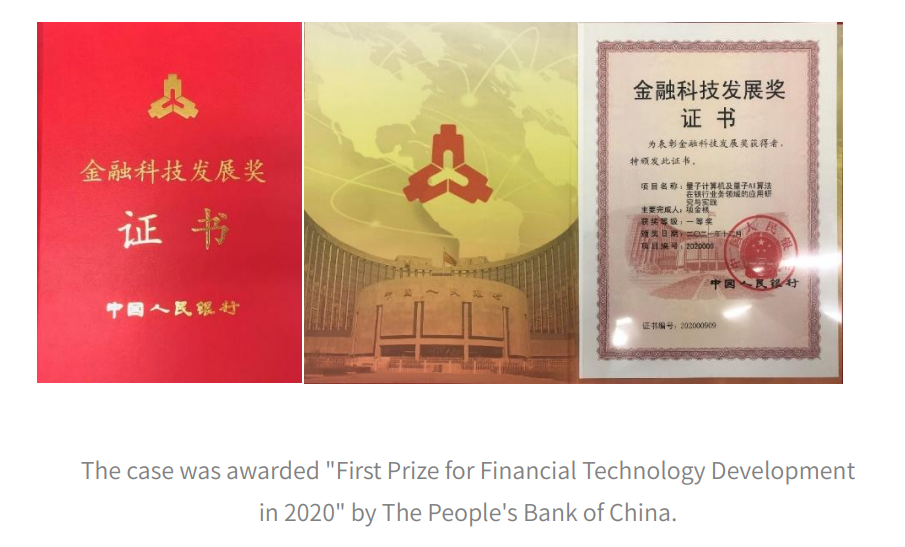Huaxia Bank Partners with SpinQ to Develop Quantum AI Models for Smarter Commercial Banking Decisions
2025.01.09 · Blog quantum advantagequantum readyquantum supremacy
With the gradual industrialization of quantum computing, numerous business sectors are on the cusp of transformation, with the financial industry showing exceptional promise.
Leveraging SpinQ's genuine quantum computers, LongYingZhiDa Fintech—a subsidiary of Huaxia Bank—has partnered with SpinQ to develop a quantum neural network algorithmic model.
This model offers a basis for determining the reduction of ATM machines, aiding in the intelligent decision-making and digital transformation of commercial banks' operations and management.

The Diminishing Role of ATMs: Commercial Banks Tackle Cost and Efficiency
Once hailed as the "most useful invention" in banking, ATMs have seen a decline with the advent of mobile payments. As cash usage decreases, ATM utilization has followed suit. Despite this, ATM costs remain high, prompting many banks to reduce their numbers.
In 2020, over 40,000 ATMs were eliminated nationwide. By the end of 2022, China's ATM count stood at 895,900, a 51,900 drop from the previous year, with a ratio of 6.35 ATMs per 10,000 people, marking a 5.42% annual decrease.
For commercial banks, managing the extensive ATM network is challenging due to the diversity of customers and environments. Optimizing ATM deployment and identifying underperforming or seldom-used machines for withdrawal to cut costs is a pressing issue.
Quantum Computing and Quantum AI Models: Providing a Basis for ATM Optimization
To address ATM layout optimization, LongYingZhiDa Fintech has worked with SpinQ on an empirical analysis of quantum neural networks using SpinQ's proprietary nuclear magnetic quantum computer.
Quantum neural networks are parameterized quantum circuits capable of running quantum variational algorithms and addressing the same problems as classical neural networks but with enhanced data handling and representation capabilities on larger-scale quantum computers.
The collaboration was structured into four main stages:
1. Data acquisition, selecting 2243 ATMs across China over two years.
2. Intelligent prediction model construction using statistical methods to identify key features such as failure rates, replenishment timing, withdrawal rate trends, and average daily operation times.
3. Data conversion through quantum variational embedding for quantum data encoding.
4. Execution of the quantum neural network model on a quantum computer to yield experimental results.
It is worth mentioning that based on constructing the intelligent prediction model, the final running result of quantum neural network calculation is guaranteed by using the real quantum computer.
The SpinQ Gemini Portable NMR Quantum Computer, developed independently by SpinQ, uses the cleavage energy level of nuclear spin under a strong magnetic field as the 0 and 1 states for quantum qubits. It manipulates these nuclear spins to perform quantum gate operations by transmitting electromagnetic waves. One key advantage is its ability to operate at room temperature and pressure, which not only enhances experimental efficiency but also accelerates the time needed to obtain results in collaborative research.
As for the final result, the quantum neural network was used to make a judgment on whether the ATM machine of a commercial bank was retrenched or not, with an accuracy rate of 75%. Compared with the classical algorithm, the quantum neural network model not only improves in terms of accuracy, and computing speed is faster, but also the time required for the model running process is shorter, and the precision is higher.
It is worth mentioning that quantum computing can find the optimal solution for ATM placement in the absence of sample parameters, which is more accurate than classical computers.
Since the application of the project results in Huaxia Bank, it has been applied and promoted in the operation and management lines of all branches with remarkable results, which has played an important demonstrative role in the wide application of quantum technology in the financial field in the era of digital economy.
The results of the project also won the first prize of the "2020 People's Bank of China Financial Science and Technology Development Award", which is the first time in the history of the award in the field of quantum computing.

Quantum Computing's Enormous Potential: New Opportunities for Financial Industry Transformation
LongyinZhiDa further applied the quantum K-means clustering algorithm in collaboration with SpinQ for smart counter operation cluster analysis, providing scientific decision-making and optimization for commercial banks' operational management and digital transformation.
The potential of quantum computing in finance extends beyond ATM optimization. The quantum neural network model applies to various scenarios, including intelligent operations, precision marketing, and risk control.
Global financial institutions have actively explored quantum computing applications. JPMorgan Chase, for instance, uses quantum computing for investment portfolio optimization, while Banco Caixa and BBVA Corporation are leveraging quantum algorithms for risk assessment and derivative pricing.
Quantum computing is set to play a significant role in the financial industry's transformation, from optimizing investment portfolios and derivative pricing to risk management and financial security.
Featured Content






